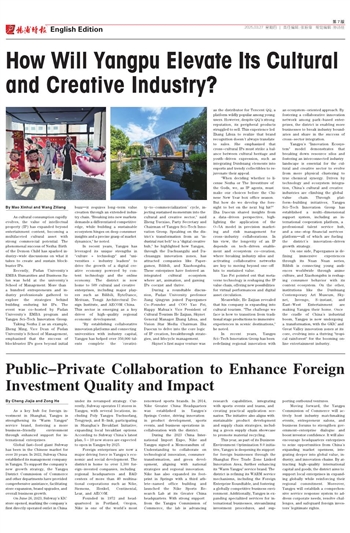By Mao Xinhui and Wang Ziliang
As cultural consumption rapidly evolves, the value of intellectual property (IP) has expanded beyond entertainment content, becoming a multifaceted cultural asset with strong commercial potential. The phenomenal success of Nezha: Birth of the Demon Child has sparked industry-wide discussions on what it takes to create and sustain blockbuster IPs.
Recently, Fudan University's EMBA Humanities and Business Salon was held at the university's School of Management. More than a hundred entrepreneurs and industry professionals gathered to explore the strategies behind building enduring hit IPs. The event was co-hosted by Fudan University's EMBA program and Yangpu Sci-Tech Innovation Group.
Taking Nezha 2 as an example, Zheng Ming, Vice Dean of Fudan University's School of Management, emphasized that the success of blockbuster IPs goes beyond initial buzz—it requires long-term value creation through an extended industry chain. "Breaking into new markets demands a differentiated competitive edge, while building a sustainable ecosystem hinges on deep consumer insights and a precise grasp of market dynamics," he noted.
In recent years, Yangpu has leveraged its unique strengths in "culture + technology" and "universities + industry leaders" to drive the growth of a digital creative economy powered by content technology and the online economy. The district is now home to 509 cultural and creative enterprises, including major players such as Bilibili, ByteDance, Meituan, Tongji Architectural Design Institute, and AECOM China. This sector is emerging as a key driver of high-quality regional economic development.
"By establishing collaborative innovation platforms and connecting universities with industry capital, Yangpu has helped over 350,000 talents complete the 'creativity-to-commercialization' cycle, injecting sustained momentum into the cultural and creative sector," said Zheng Yuexiao, Party Secretary and Chairman of Yangpu Sci-Tech Innovation Group. Speaking on the district's transformation from an "industrial rust belt" to a "digital creative hub," he highlighted how Yangpu, through the Dachuangzhi and Dachuanggu innovation zones, has attracted companies like Papergames, Bilibili, and Xiaohongshu. These enterprises have fostered an integrated cultural ecosystem where art, animation, and gaming IPs coexist and thrive.
During a roundtable discussion, Fudan University professor Jiang Qingyun joined Papergames Co-Founder and COO Yao Fei, Happy Mahua's Vice President of Cultural Tourism He Zaijian, Skynet General Manager Zhang Lihua, and Vision Star Media Chairman Zha Daocun to delve into the core logic of IP creation, breakthrough strategies, and lifecycle management.
Skynet's first major venture was as the distributor for Tencent QQ, a platform wildly popular among young users. However, despite QQ's strong reputation, its peripheral products struggled to sell. This experience led Zhang Lihua to realize that brand recognition doesn't always translate to sales. She emphasized that cross-cultural IPs must strike a balance between cultural heritage and youth-driven expression, such as integrating Dunhuang elements into esports and trendy collectibles to rejuvenate their appeal.
"When deciding whether to license Nezha or The Investiture of the Gods, we, as IP agents, must make our choices before the Chinese New Year box office season. But how do we develop the foresight to bet on the next big hit?" Zha Daocun shared insights from a data-driven perspective, highlighting the application of the O-5A model in precision marketing and risk management for cross-industry collaborations. In his view, the longevity of an IP depends on tech-driven enablement and ecosystem co-creation, where breaking industry silos and activating collaborative networks are key to moving beyond one-off hits to sustained value.
Yao Fei pointed out that metaverse technology is reshaping the IP value chain, offering new possibilities for virtual performances and digital asset circulation.
Meanwhile, He Zaijian revealed that his company is expanding into cultural tourism. "The challenge we face is how to transition from traditional stage productions to immersive experiences in scenic destinations," he noted.
In recent years, Yangpu Sci-Tech Innovation Group has been redefining regional innovation with an ecosystem-oriented approach. By fostering a collaborative innovation network among park-based enterprises, the district is enabling more businesses to break industry boundaries and share in the success of cross-sector integration.
Yangpu's "Innovation Ecosystem" model demonstrates that breaking down resource silos and fostering an interconnected industry landscape is essential for the cultural and creative sector to evolve from mere physical clustering to true chemical synergy. Driven by technology and ecosystem integration, China's cultural and creative industries are climbing the global value chain. Through platform-building initiatives, Yangpu Sci-Tech Innovation Group has established a multi-dimensional support system, including an international cooperation platform, a professional talent service hub, and a one-stop financial services platform—all of which are fueling the district's innovation-driven growth strategy.
On one side, Papergames is defining immersive experiences through its Nuan Nuan series, Bilibili is connecting young audiences worldwide through anime culture, and Xiaohongshu is reshaping consumer behavior with its content ecosystem. On the other, institutions like the Dunhuang Contemporary Art Museum, Skynet, Invengo, S-instant, and East-West Entertainment are making Yangpu their home. Once the cradle of China's industrial boom, Yangpu is now undergoing a transformation, with the GKIC and Great Valley innovation zones at its core, evolving into a thriving "tropical rainforest" for the booming online entertainment industry.



